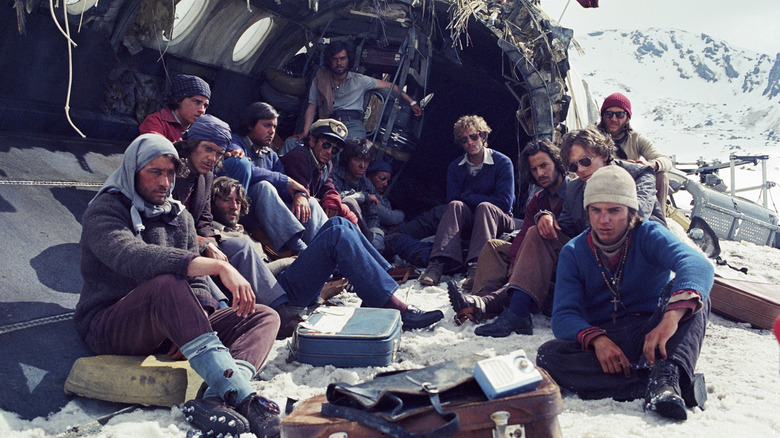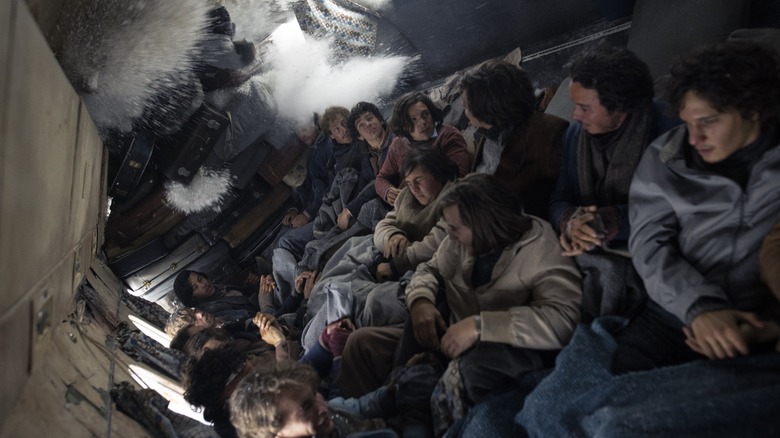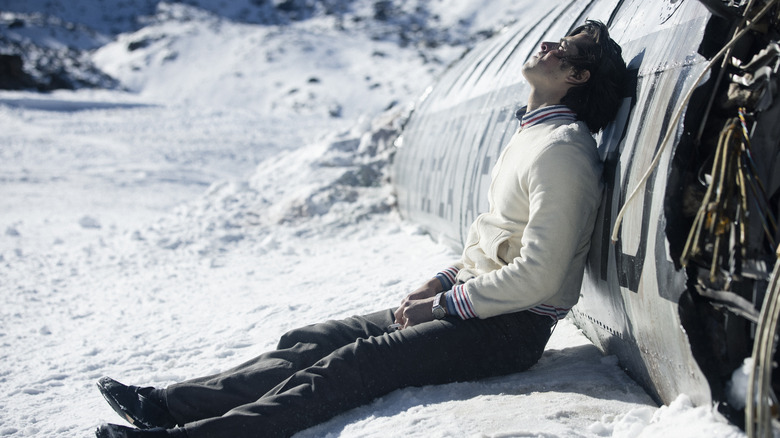Netflix's Society Of The Snow Does What No Other Portrayal Of The Andes Disaster Does
Netflix's latest movie is the epic drama "Society of the Snow," directed by J.A. Bayona. The Spanish-language drama is based on the Andes tragedy (also referred to as the Andes miracle) of 1972, wherein a charter plane carrying 45 people — including members of a Uruguayan rugby team — crashed in the Andes mountains, leaving the survivors stranded in an extremely harsh environment for 72 days. This is a story that has fascinated people around the world for decades, inspiring three movies, many documentaries, and serving as the inspiration for "Yellowjackets."
Most adaptations tend to focus on the more sensationalist aspect of the tale: cannibalism. The first feature film based on the tragedy was a Mexican exploitation movie, and arguably the most famous film is the American production "Alive," directed by Frank Marshall and featuring a whitewashed cast that included Ethan Hawke. That movie turned the story into an uplifting tale of survival, more about the miracle than the tragedy.
This is why Bayona's film, adapted from the non-fiction book of the same name by Pablo Vierci (who wrote it with the help of other survivors, many of whom he knew from childhood) is so special. The film is a spectacular and heartbreaking drama, with the crash shot like a horrific nightmare: a gruesome affair reminiscent of Bayona's "The Impossible." Where the film shines, however, is in its depiction of the Andes disaster, and its focus not on the living, but on the dead.
A tragedy retold
"Society of the Snow" features voiceover narration, but rather than that voice being the leader of the survivors, our narration is one of those who don't make it, dying 12 days before the rescue.
Indeed, the film places its focus not on a particular leader, or even just on the survivors, but on the collective, especially those who did not return. This is a movie about camaraderie and love, about the unspoken (and also spoken) contract between living and dead, about those who stayed behind so the others could make it back home. That contract, of course, is what every other adaptation ends up focusing on — the cannibalism. Any other film would focus on the taboo, the disgust, and the struggle the living go through having to succumb to such lengths to survive. Not "Society of the Snow." Bayona makes this a tale of beautiful and tragic sacrifice on behalf of the dead, who give their bodies so their friends can live on.
This gives the script a philosophical and religious layer. Like Scorsese's "Silence," it explores the place of faith and guilt. As soon as food runs out, and the question of whether they will eat the dead is raised, it immediately becomes a lengthy and heated debate. "Will God forgive us?" a character asks. "God has nothing to do with this," another responds. The film portrays the question of cannibalism as one of consent. We never see the butchering of the bodies, but we do see plenty of scenes of characters talking about offering their bodies when they die, permitting the others to consume their flesh and live in remembrance of them.
Faith and sacrifice
It's no coincidence that "Society of the Snow" ends with an image of the survivors sitting around like the 12 apostles in The Last Supper, the bodies of their departed friends becoming the bread of life in a communion of survival. Survivor stories — at least, the ones that Hollywood loves — are about characters who go through tragedies and come out stronger on the other side. That is not "Society of the Snow." This movie features characters who live, sure. But it's about the lives that were lost, the lives that were never lived. The film becomes a story about those who live but told by those who stayed behind to allow them to live. "They were dead like us. And only they got to return home," says the narrator towards the end.
It is significant that the survivors are constantly talking about being already dead, because it makes them all equal. They all played their part, both the ones that made it home, and the ones that stayed behind. The only reason there are survivors in this tale is because there are some who died, who gave up their bodies so the rest could carry on living. The cannibalism isn't treated as a taboo or as a source of shame, but as a collective sacrifice. It's why the film closes with one final voice-over, "Tell everyone what we did in the mountain." This is the first movie about the Andes disaster that remembers the story is not about just the 16 survivors, but about the 29 who didn't make it, about the society of the snow.
"The Society of the Snow" is available now on Netflix.


